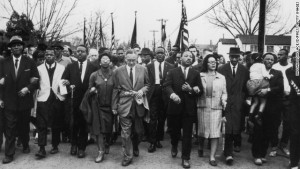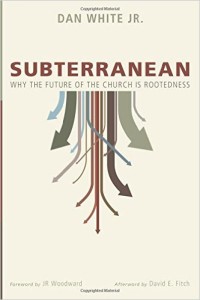 In the wake of another heinous attack taking the lives of innocent civilians, the world feels increasingly unstable. The violence “over there” is no longer relegated to headlines on the other side of the world; it is edging closer to our doorsteps and threatens to invade our everyday lives.
In the wake of another heinous attack taking the lives of innocent civilians, the world feels increasingly unstable. The violence “over there” is no longer relegated to headlines on the other side of the world; it is edging closer to our doorsteps and threatens to invade our everyday lives.
In light of this reality, conversations ranging from our coffee shops to the halls of political power are shouting out the necessity to pursue security and safety above anything else.
I get it.
As a father of four little kids, there has never been a season in my life when I’ve felt more compelled toward security and safety. I can’t begin to comprehend the disorientation and paralyzing pain that would come with the harm of my family.
For the past five years, I have regularly been traveling to conflict zones in the Middle East, but the more kids I have waiting for me to safely return home, the harder it gets to step on that plane and make an intentional decision to move toward exposing myself to violence.
In short, when I hear our current political candidates talking about the paramount importance of “security” and “safety,” it strikes a chord and I find myself tempted to stand up and applaud.
AND THEN I PAUSE, step back for a moment, ask some harder questions of where my applause is coming from, and consider my kingdom allegiance marked by One who moved toward rather than away from potential violence.
I’m convicted that my desire to applaud this “security at any cost” rhetoric and policy is a temptation to worship the idol of safety. It is not something to be admired, it is something to be acknowledged, questioned and repented of (turned away from). Worshiping the idol of safety greatly inhibits our ability to worship the crucified and risen Jesus.
It’s not that I don’t want safety for me, my family or the world. I actually want that more than ever, but when I look at this through the lens of discipleship (following Jesus), here are the issues I’m wresting with today:
- The objective of terrorism is to instill fear. Politicians then use that fear to shape a reality that advances their agenda. What they are offering us is nothing more than a pseudo-reality that requires we have the discernment to see through the smokescreen to what is actually real. My desire for safety is real, but in reality, I should be far more concerned about a car wreck, chronic disease or natural disaster than terrorism. When I begin making decisions from a place of fear, I not only buy into a pseudo-reality that is being crafted by political power plays, I begin to close my eyes to the new and dynamic ways God is calling me to join in the world he is making.
- The means through which we pursue safety often force us to compromise our kingdom identity and can lead to less safety. First, let me acknowledge that political leaders are responsible to tend to the safety of citizens and can make the decisions they feel are necessary to do so. With that said, we, as the Church, can’t allow our political allegiance to trump our kingdom allegiance. When we worship the idol of “safety,” we can quickly compromise our kingdom witness and begin to justify the means through which safety is achieved. For example, when we celebrate the death of other human beings because it means we are “safer,” we may be worshiping the idol of safety rather than the enemy-loving God embodied in Jesus. When we demonize and punish entire groups of people (the vast majority of whom have no desire to do us harm) for the sake of our “safety,” we may be worshiping the idol of safety rather than a Jesus who loved indiscriminately. When we reject the very people (many of whom are children!) who are fleeing violence for the sake of our “safety,” we may be worshiping the idol of safety rather than a Jesus who calls us to care for the “strangers in our midst.” Finally, while these may feel like safety measures, it is growingly clear that these means don’t lead to a lasting, sustainable security and safety. Rather, they more often lead to resentment, oppression and instability, which then breads more violence.
- I can’t reconcile withdrawal, isolation and a posture of defense with a God who moved toward violence, brokenness and “the other” in Jesus. As I’ve been wresting with this idol of safety, I’ve repeatedly been convicted by this truth; Jesus never called us to be safe; he called us to be faithful. According to Jesus, faithfulness moves us beyond love of neighbor to love of enemy. If pursuit of my safety trumps my ability to love whoever God has in my path, fear wins and I distance myself from God’s heart for the world. How can I love my “enemy” if I don’t know them? The idol of safety moves us away from people who are different than us and sends us inward to those who look, think and act like we do. There is no love outside of relationship; there is only misunderstanding, demonization and stereotype. Lastly, how can we know our “enemy” if we don’t cross the borders that divide us? The Jesus Way requires we reject the temptation to move inward and continually calls us to move toward “the other.”
Interestingly, I find myself wresting through this stuff during Holy Week. This is the week in which Jesus models to the world life as it was meant to be lived. It is a life marked not by isolation or triumphant overthrow, but by suffering, sacrifice and selfless love for the flourishing of others. It is a life that crosses borders and boundaries to reassign the humanity, dignity and the image of God in all the “wrong” people with whom he should have feared and stayed away from. A life that ended with the uttering of this prayer for his enemies, “Father, forgive them for they know not what they do.” These are the stories we tell in Sunday School and say, “Wow, Jesus is a bad ass. He wasn’t scared of anything and I would do anything to live and love like that.”
Imagine if instead he chose to worship the idol of safety and never left the safety of his little Galilean synagogue so he could read Torah and remain isolated from all the violence of the world? That story would not only suck, it wouldn’t reflect the heart of a God who literally moved into our human neighborhood to remind us what love looks like.
So, during this Holy Week, let’s pay attention to the very understandable fear, paralysis and temptation to worship the idol of safety. If I’m completely honest, I’m still having a hard time with this. This is not easy stuff and I’m not happy about having to make these intentional decisions to keep perspective in a world that feels so unstable. But, friends, this is the beauty, challenge and mystery of choosing to follow an enemy-loving God who – this Holy Week – invites us to love to the point of death, while being fueled by the hope and reality of Resurrection.
May it be so.
 The other night Janny and I sat on our front patio after getting all the kids down to listen to the sacred silence and debrief our day. We talked about our new neighbor hanging out in our yard to help out with the twins and reflected on the life of our little faith community while meeting another new neighbor who happened to be on an evening walk with her dog, Nelly.
The other night Janny and I sat on our front patio after getting all the kids down to listen to the sacred silence and debrief our day. We talked about our new neighbor hanging out in our yard to help out with the twins and reflected on the life of our little faith community while meeting another new neighbor who happened to be on an evening walk with her dog, Nelly.  This coming Monday is our national celebration of the life and legacy of Martin Luther King Jr. As I have been reflecting on his work and witness, I am convinced his message is as necessary and prophetic today as it was when he was alive (if not more!).
This coming Monday is our national celebration of the life and legacy of Martin Luther King Jr. As I have been reflecting on his work and witness, I am convinced his message is as necessary and prophetic today as it was when he was alive (if not more!).  Year after year as my community seeks to live well in the unique soil of our little neighborhood, we discover how much our neighborhood has to teach us about ourselves, each other and the One we follow. Because real life is textured with both the beautiful and broken realities of humanity, we find ourselves formed and informed in new ways that we couldn’t have ever expected. For this reason, we make plenty of space for our theology to be shaped not only from “above” through our intellect, study and empirical insight, but also from “below” through the realities of God’s presence in the mundane of everyday. In fact, it is often this lived theology that most clearly reveals to us where we fit in God’s story that is unfolding in our place.
Year after year as my community seeks to live well in the unique soil of our little neighborhood, we discover how much our neighborhood has to teach us about ourselves, each other and the One we follow. Because real life is textured with both the beautiful and broken realities of humanity, we find ourselves formed and informed in new ways that we couldn’t have ever expected. For this reason, we make plenty of space for our theology to be shaped not only from “above” through our intellect, study and empirical insight, but also from “below” through the realities of God’s presence in the mundane of everyday. In fact, it is often this lived theology that most clearly reveals to us where we fit in God’s story that is unfolding in our place.